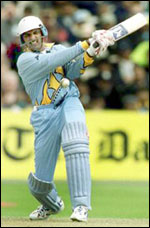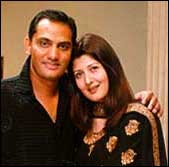The fallen icon
Amberish K Diwanji
Like millions of Indians, I am a fan of Mohammad Azharuddin, as I am of Sunil Gavaskar,
Kapil Dev and Sachin Tendulkar. And like millions, I am shocked by the revelations
of the complicity of Azharuddin and others in the match-fixing
controversy.
Today, our heroes of the cricketing world stand before us
as men who betrayed us. And if among these fallen
heroes there is one person for whom the maximum opprobrium is reserved,
then surely it must be for Azharuddin.
 More than anyone else, Azharuddin as a captain symbolised communal harmony and Muslim aspirations.
More than anyone else, Azharuddin as a captain symbolised communal harmony and Muslim aspirations.
In the years that saw India's worst communal carnage since Partition -- the year when the Babri Masjid was destroyed and communal violence in India (and Bombay in particular) claimed thousands, when gangsters
carried out blasts in Bombay killing hundreds of innocents, when Hindus and Muslims looked at each other with suspicion and even hatred, the Indian cricket team was led by a Muslim.
And there was the hope and feeling that Azhar at the
helm provided the much-needed balm for India's communal divide.
Azhar's captaincy was clouded with controversy and on numerous
occasions, there were rumours and attempts of replacing him. Yet, on
every occasion but one, he staved off all challenges. Proving that even during India's worst communal years, captaincy was decided by many factors and cricketing politics,
but not by a person's religion.
When Azhar played for India, he represented India. It was a time when
many Hindus held the view that every time India played Pakistan, the
Muslims cheered for Pakistan and celebrated India's defeat. It
was a time when Hindus saw Muslims as being responsible for the
Bombay blasts, for the communal divide, as a backward community of men
with four wives and easy divorce laws, of a
community that was anti-India and agents of Pakistanů
It was during these worst of times that Azhar stood out as the beacon of
hope. And showed that Muslims too could (and did) give their best for
India.
So much so, that even Bal Thackeray once proclaimed that the Shiv Sena
was "not against patriotic Muslims like Azharuddin" but only against
non-patriotic Muslims (presumably like Dawood Ibrahim).
Alas, Azharuddin has betrayed both India and his Muslim brethren. But
while India will recover soon, as she always has from the misdeeds of
her people, Indian Muslims will take much, much longer. Their wound is
deeper.
In one stroke, Azhar has strengthened the stereotype among many Hindus
that "Muslims cannot be trusted;" that even at the highest level, their
loyalty is not to India. Today, those Hindus who have spewed hate
against Muslims will smirk: "See what Azhar did" and "If even Azhar
cannot be trusted, can anyone else?"
Azhar may believe that he is being picked while other
culprits let off simply because he is a Muslim. But it is precisely for that
very reason (that he does represent the Muslims even as he represents
India), he should have been even more careful, even more circumspect,
and much more honest.
There is little point in Azhar saying that he is only one among many
accused (the rest, incidentally, being Hindus). For the tragic fact is
that in these communal times, a Muslim culprit is seen as a Muslim,
while a Hindu culprit is seen as an individual.
Moreover, Azhar was the captain and therefore had a far greater
responsibility. As the leader the team, he
more than anyone else and like Caesar's wife, should have been above
suspicion. Azhar's fame and reputation is far greater than all the
other players named by the CBI (second only to Kapil Dev, arguably the
greatest of them all. The CBI has exonerated him, but whose name remains tainted and whose iconic
status lies in tatters today).
In the years to come, will anyone remember someone like Ajay Sharma? And will anyone forget Azhar?
Azhar is the only person who hit three consecutive centuries in three
consecutive matches on debut. He is India's most successful captain! And
he was a symbol of India's secularism and a source of hope in the
ravaged communal years of the early 1990s.
His fans resided across the country and hailed from all communities.
Even if some of these communities fought each other during riots, they
stopped to marvel at his batting skills and cheer India to victory.
Calcutta (not his native city) loved him like no other (until the
arrival of the native Ganguly), and he gave some of his best
performances there.
He was a source of pride for all Indians, and more so for the Muslims of
India.
Yet, today, thanks to Azhar's mistakes, every new Muslim player will be
under a shadow. If Zaheer Khan bowls a loose ball, someone might wonder,
"Has he taken money? After all, even Azharů"
Azhar's curse will haunt India and Indian Muslims. And if communal riots
ever break out again, Hindu fanatics will taunt Muslims: "How can we
trust you? Remember how Azhar betrayed India."
Thanks to Azhar's greed, communalists have been given a new weapon. And
Indian Muslims' image another battering, by the very man who was (and
should have always remained) their inspiration.
 Tragically, many Muslims themselves link Azhar's downfall to the time he
got involved with Sangeeta Bijlani (a Hindu), who he married after
divorcing his first (Muslim) wife. Muslims fanatics, who too love to
paint Hindus in poor light, will always claim that a Hindu woman led
Azhar astray rather than blame the individual himself.
Tragically, many Muslims themselves link Azhar's downfall to the time he
got involved with Sangeeta Bijlani (a Hindu), who he married after
divorcing his first (Muslim) wife. Muslims fanatics, who too love to
paint Hindus in poor light, will always claim that a Hindu woman led
Azhar astray rather than blame the individual himself.
Such tales only harden the Hindu-Muslim divide by strengthening each
community's stereotype against the other.
Azhar may have just lost a few matches for India, but India has lost
much more.
Mail Sports Editor